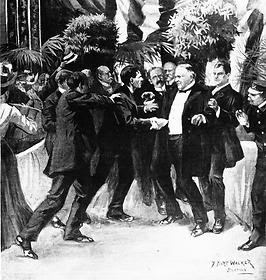For many musicians, there is a moment that changes everything for them; they get that one big hit or that one chance to make it happen for them, and they do not even realize it at the time. It may not be how they imagined it or it may not have been what they had wanted for their life, but there were chances to take and go for it.
Elvis was an awkward kid growing up, having lost his twin and being close to his mother and his father, and having his own issues to deal with. He found ways to come out his shell, but what he was really passionate about was music. Growing up, he found ways to get into music, singing with the church choir or to himself, he knew that music was it for him.

When he was ten years old, he sang for a contest in the Mississippi-Alabama Fair and Dairy Show in Tupelo.1 He was still too short to reach the microphone so he had to stand on a stool to help him reach. Even though he had no musical accompaniment, he got up and performed; he came in fifth place.2 Even though he lost, he continued to explore music, and eventually he became Elvis. But how did that happen?
For his birthday, his mother Gladys gave him a guitar. His uncle taught him chords, and Frank Smith, a preacher at an Assembly of God Church, also gave him lessons on how to play.3 He was fortunate to have these people to show him how to play, something that would come in handy later in his life. He would later become a regular performer at the Country Music Jamboree outside the Tupelo courthouse.4 He had his guitar and would take it with him to school every day, even though his classmates would make faces and ridicule him for the music he played. He still continued to do what he loved.5 Elvis ignored them and did what he wanted; he had set a goal for himself, and he was going for it.
When Elvis was thirteen, his father moved the family to Memphis; there, Elvis would hear the music coming from the black neighborhood, although he had heard some similar sounds in Tupelo.6 He was always hearing sounds; he had a talent for picking up sounds.7
Nobody thought he would have gotten to that point; he had failed music class in high school, and a teacher had even rejected him from joining the glee club. He was also rejected by a gospel quartet he was set on joining.8 It was a big disappointment for him, and he seemed to be discouraged by everyone around him, even his own father.
In August 1953, Elvis had finally gotten up the nerve to go the Memphis Recording Service; he claimed that he wanted to record a song for his mother. An associate of Sam Phillips was there that day, who liked what he heard and kept a copy of the recording Elvis had done.9 Elvis was discovered when he had already graduated from high school. His breakout occurred late in the evening on July 5, 1954 during a late-night recording session that had proved unfruitful, until Elvis started improvising on the 1940s blues song, “That’s All Right (Mama).” Sam Phillips, the head of Sun Records, happened to be in the studio to hear the improvisation of Elvis with two other local musicians. Elvis had the sound that Phillips said he could make a billion dollars, “if he could find a white man who had the Negro sound and the Negro feel.”10 Elvis had that sound.11 It was then, at that moment, that Elvis just happened. He was new, something that people were not used to yet. He was not like every other star. Though once he was discovered, he was awkward, self-conscious, nervous, he mumbled, but he was making it.12 No matter, this was the step that Elvis needed in order to be headed in the direction of greatness. He was going to make it, though in those first sessions, they were not successful; they kept on trying to achieve that sound only Elvis had, and finally it all worked out. It came out of nowhere; he did it himself. This time was only stepping stones for him, but nonetheless it was what needed to be taken; heading the direction toward the person we know today as the King of Rock n Roll.
- Bobbie Ann Mason, Elvis Presley (New York: Viking Books, 2003), 17. ↵
- Mason, Elvis Presley, 18. ↵
- Glen Jeansonne, David Luhrssen, and Dan Sokolovic, Elvis Presley, Reluctant Rebel: His Life and Our Times (Praeger, 2011), 11. ↵
- Glen Jeansonne, David Luhrssen, and Dan Sokolovic, Elvis Presley, Reluctant Rebel: His Life and Our Times (Praeger, 2011), 11. ↵
- Peter Guralnick, Last Train to Memphis: The Rise of Elvis Presley (Little, Brown & Company, 1994), 27. ↵
- Mason, Elvis Presley, 19. ↵
- Mason, Elvis Presley, 20. ↵
- Mason, Elvis Presley, 23. ↵
- Mason, Elvis Presley, 25. ↵
- James Miller, Flowers in the Dustbin: The Rise of Rock and Roll, 1947-1977 (Fireside, 2000), 72. ↵
- Mason, Elvis Presley, 21. ↵
- Mason, Elvis Presley, 23. ↵


77 comments
Jazmin Pizana
Very interesting article! I’ve never personally listened to Elvis before but I have heard about him many times growing up. It’s very interesting to find out that he was not successful from the beginning. He encountered many failures and disappointments but he was determined and pushed through. He goes to show that hard work pays off and having faith in yourself when no one else does will help you achieve your goals.
Michael Mandujano
This article is truly inspiring, it provides an overview that the King’s road to success, was not instant success. In fact, this article allows many individuals to realize that they should not give up on their dreams when one fails. I enjoyed how this article went into depth on how Elvis Presley experienced hardships such as losing loved ones, being cut from the Glee club auditions. Those setbacks allowed the King to remain consistent and overcome his adversities.
Cameron Mays
This article is quite good for a few specific reasons that I found, but also for many more as well. To me however, this article is quite inspiring because you are able to really relate to someone so famous and well-received. In other words, because Elvis wasn’t immediately successful, we can learn that nothing worth having comes easy. Aphorisms aside, it does help us relate to him, and bring us in your essay, assuring that your readers will stay for the whole thing. This by itself is great, but because of the research that went into the essay, it becomes exceptional.
Alyssa Vela
I liked that in Part one you went as far back into his life as from birth. In part two you were able to cover just as much if not more detail regarding his life. Who knew he had so many setbacks and rejections. Elvis was determined to be the King of Rock, and the King of Rock he was! Kudos on writing such a great article! Keep up the good work!
Ana Gonzalez
Good article. I enjoyed reading your article and learning more about Elvis. I had no idea Elvis had a twin and I wonder how the death of his brother impacted his musical career or how old Elvis was when he had to deal with this. I suggest you try to explain these types of things in more detail. Other than that, this was a fun article to read because I love learning about what obstacle, both internal and external, music stars had to overcome to succeed.
Sam Vandenbrink
Great article although I felt like it just ended kind of abruptly. Its hard to believe the king of rock n roll was once self conscious. He didn’t know or think he would ever be that successful until it happened all of a sudden. Elvis has a great story and this article did it great justice, both part one and part two. Its easy to get overwhelmed in todays music and society reading an article about the King was nice!
Alexis Soto
I enjoyed both articles about Elvis. You were able to present a clear view of Elvis before he became the King. You explained well of his early challenges presented to him early on but was able to persevere. Elvis seems more humane now after reading this two-part series. I also enjoyed how you were able to mention the origins of Rock and Roll and how Elvis was inspired by the music of the African American musicians.
Aaron Mcglown
This article was well written, very organized and had a lot of facts that i did not know. I never knew Elvis had so many setbacks in career. Its amazing how determined he was even after getting rejected so many times. His determination made him into the king of rock and roll. overall, this article helped me understand Elvis more. good job!
Bailey Rider
It was very interesting to learn that Elvis had a twin that died. I loved learning also how such an iconic, great musician failed and was rejected multiple times before he was “discovered” and made his big break. I love that he had the determination to keep going and follow his dreams, even if he got picked on and rejected along the way. Thank you for the amazing article!
Gabriela Serrato
It is great to read about the success of Elvis because he did try and try again when no one would give him opportunity. It is inspiring, at least to me, to know that this legend was turned down numerous times before he made it. This also lets readers know that if one is truly passionate about something, do not let rejection or a failed class turn you away. Do what you love and that is all there is to it. Elvis really demonstrated that.